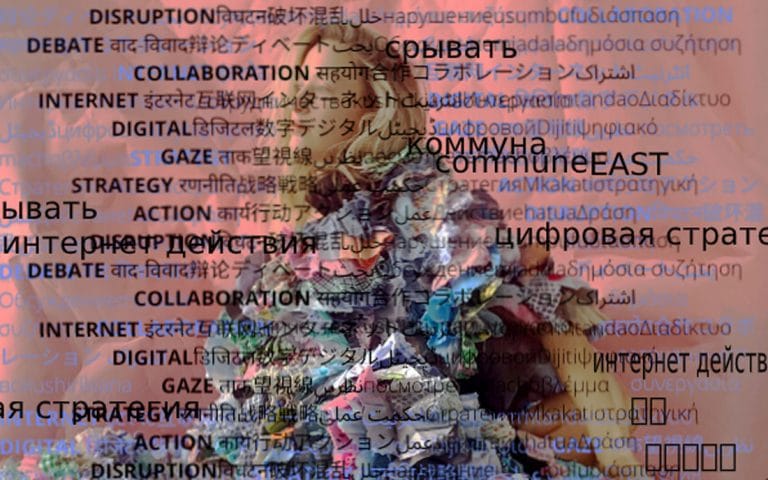Good to Know: Leanne Elliott Young, the spokesperson for fashion innovation
Recently, the links between fashion, art, innovation, and sustainability have been getting stronger. And while their presence is growing in notoriety, fewer people seem to know about the actual people pushing driving this change. Leanne Elliott Young is one of those spokespersons advocating for fashion innovation. The co-founder of CommuneEAST, a London-based module agency for strategic partnerships, has worked in the world of fashion, art, and technology for over ten years, and has worked for some of the industry’s biggest names—from the British Fashion Council and the Selfridges Group to Opening Ceremony and ACE Hotel.
Young’s career, as well as her main project, CommuneEast, is based on a very clear vision she has for the future. Young started questioning the fashion industry before everyone else followed, by aiming to create the trends of the future. From sustainable fashion, innovation, and digital clothing, Young is here to question and disrupt the system, crush old fashion rules under her Margiela boots, and start creating a more sustainable industry.
1. What it is that you do exactly through CommuneEast, and what was the idea behind it?
In 2015, CommuneEAST was birthed as a space for questioning, collaboration, exchange and fusion through actions in a view to creating a holistic utopian sensory output. This has effectively become our team considering and investigating what the blur of our IRL and realities looks like, sounds like, and tastes like, and investigating the implications of this new era of communication. We are rooted in questioning the status quo, abolishing echo chambers, and asking ‘big questions’. This work exists within the glo-cal public sphere incubating talent and relationships to live events, debates, creative direction, strategic cultural partnerships and through the social media and the augmented work we deliver.
Right now we are looking at the disruptive new modes of behaviour through the industry, how the big archaic systems are being challenged, quashed, and dismantled by the new breed of energetic, agile, multidisciplinary free-thinkers. It’s an exciting time with many changes approaching, specifically through creative commerce. Within fashion, the ever-looming and urgent sustainability agenda are key areas of concern for us.
2. The fashion industry has been criticised for its lack of diversity for a long time (whether racial, religious, or gender-wise). With CommuneEAST, you’ve tried to change this and create a conversation by organising events and panels. There definitely is a shift coming, slowly but surely. What more do you think can be done for this shift to have permanent results, and, hopefully, take place sooner?
I never hire anyone who looks like me. Within CommuneEAST, we work collaboratively through all layers of the company pushing for questioning, which inherently means growth. For example, our #IRLCommuneEASTBookClubs is a public-facing program at The Curtain Hotel based on disruption—it’s a book club where we ask questions on the importance of printed matter, we investigate, dissect and hear individuals that are giving an important voice to hard questions. It’s purely philanthropic, we just curate a safe space for individuals, authors and thought leaders to broadcast their message and host intimate and sensitive debates. The shift we can see and feel is, I think, unfortunately just the echo chamber of London, it’s a slow turn of a big ingrained belligerent beast, with blackface, my tribe next door, far-right flags flying high and still big businesses pushing back on CEOs that do not fit the mould.
There are only 25 women CEOs in the Fortune 500. In the UK, there are currently six female CEOs among the top 100, down from seven last year. There are four black Fortune 500 CEOs versus seven less than a decade ago. Moreover, not a single black woman helms a Fortune 500 or S&P 500 corporation on a permanent basis. Social media platforms can drive a lot of open conversations, but with shadow bans and the reins being within the hands of white patriarchal western authorities, we are seeing conversations being shut down. When a positive celebration of the body occurs and the male gaze is removed, the censorship begins, with Pxssy Palace’s Instagram account being a classic example of that.
So what can you do? Call people out and educate, create save spaces, discuss and push back in public and in private, in both IRL and URL. Make a stand and take it upon yourself to make a difference. Making a difference means changing habits, which sometimes, in fact, all the time is uncomfortable. No pain no gain. And there is so much to bloody gain! I’d also urge everyone to write to local government on causes you care about and just make your voice heard, be active and not just on a reshare on Instagram.
3. What is your opinion on what’s happening in the fashion industry at the moment? And what advice would you give someone who wants to start shopping more sustainably but that doesn’t have a big budget?
The tactics of the high-street are interesting to monitor as they are nimble in comparison with the big archaic beast that is the rest of the fashion industry. They used TV reality shows such as Love Island to promote their brand. New modes of communication like this use of influencer placement is disruptive as it fed into the behavioural habits of our current times.
With sustainability, the key issue is transparency, which currently we are not being delivered on a governmental level. 360 sustainability is still something which we can not preach as we are still within a learning curve. Yes, it does feel like a hobby of the privileged folk to broadcast and call out those who can not afford the Stella McCartney gym set or even are just shopping at Primark as that is their only budget, and yes there are conversations on the fact that fast fashion has democratised fashion, but we are buying more than we need, at a faster pace than our parents and the planet is at stake here with 20 per cent of global water waste and 10 per cent of the global carbon emissions coming from fashion.
1 cotton t-shirt needs 2,700 litres of water to be produced—that’s what a person drinks in 2.5 years. We are purchasing 60 per cent more items of clothing compared to 2000, and on average 40 per cent of clothes in our wardrobes are never worn, with 300,000 tonnes of used clothing going to landfill in the UK every year.
We need to change, change the marketing language, change the influences, the positioning, the press stories, the education; change the fashion calendar agenda so that all in all it is fashionable and appealing to buy sustainable. The fast fashion industry feasts off of the creative phenomena that is upon the catwalks and is a bastardisation of those tropes. Let’s restructure what fashion means to us; let’s reuse, restyle, remake, upcycle, repair, share.
Depop is a great marketplace to start, with their algorithms and filtering tools you get an inspiring selection of fresh design talents, second hand and also limited editions, don’t be put off by the new gen aesthetic.

4. You write about art, as well as attending a lot of art fairs and other art events. Where does your interest in art come from?
I have a fine art background, a Master’s, plus having parents who were artists. My father was a tattoo artist, my mother practised law and was a painter. I inherited the understanding and importance of image-making, and the deep semantics it holds.
Communication is something we are primarily interested in CommuneEAST, so the creative industries is where we spend our time, be that spans art, fashion and the sciences. Any project’s thought pattern starts with dissecting the problem creatively, driving solutions through those creative channels. We frequently visit galleries, talks, events. At the moment, we’re working with the V&A, so watch this space!
5. How do you think fashion and art shine a light on important causes?
They have the ability to be provocative and sensitive in unison. That is what they need to do now.
6. How would you convince someone who has little knowledge about art to get a closer look at it?
You need to get your head into it, go alone, walk a gallery with just you, then go with a friend, always drink a lot of coffee, have a sugary drink, perhaps a tequila? Private views are not for seeing art, they are for seeing people. I always go again shortly after if I can.
If you’re a social person remove that desire to rant as you go along, there is no right or wrong answer to art—that’s the key. My grandfather used to spend his time in London galleries, his favourite thing was if it was a collection with the same curation, he’d choose one person to follow, just to see their patterns and choices, each gallery visitor became a new way to observe the works.
7. What are your favourite fashion brands or designers at the moment?
Matty Bovan, Art School, Rottingdean Bazaar, Mowalola Ogunlesi, BERTHOLD, Parc, Per Götesson, Louise Grey, Roksanda, Charles Jeffrey, Martine Rose, Liam Hodges, STAFFONLY, Women’s History Museum, Eckhaus Latta, Courrèges, Nicole McLaughlin, Tolu Coker, Rahemur Rahman, Ancuta Sarca, and the list goes on… And I still would have sex with anyone in a Tom Ford suit.

8. Do you think there is a future for AI in fashion or that the hype surrounding it will eventually die out?
The sci-fi future we all yearn for, or sometimes fear for, has a second coming—AI and biotech. There is a struggle and a race to align new strategies through business and lifestyle in order to back the exponential growth through these new territories. We are now in a time of technological and human existence as one. AI has already peaked and now is a vital part of the industry, AI and machine learning power the algorithms and imprint on the choices we make. The rise of AI and automation, and the blurred parameters it sits within means through lack of knowledge, imprinted fear, and closed communication streams the world is intrigued but mostly scared and particularly, absolutely confused about what AI even is.
52 per cent of individuals believe Lil Miquela is an AI influencer, which shows the stark reality of misunderstanding of what AI and machine learning is. She is nothing more than a photoshopped image and a mediocre algorithm at best, but one lucky enough to attend FRow at FW, be the lead in the new Calvin Klein advert. Oh and kiss Bella Hadid for that campaign. There is a debate on education, on understanding AI and how to educate outside of Silicon Valley.
9. What exactly are you predicting for the future? Any futuristic fantasies?
Sex with robots IRL for my future fantasy. Also, time will be a commodity that is sold back to us. Biotech will be as big as the tech revolution. DNA hacks. Nanobots. Home health care devices. Disconnecting will be a spa moment. Flying will be phased out. Rental will be the end of ownership. A larger class divide. More dystopian entertainment as we get closer to the change. Algorithms beyond the grave.
10. Finally, what do you want to leave behind you for future generations?
A chance to dance (naked) with others, in the open-air, listening to a loud heavy base. Basically, let’s re-instigate IRL, let’s make the planet cleaner, let’s appreciate the ground beneath our feet, physically! And let’s all appreciate being naked.





